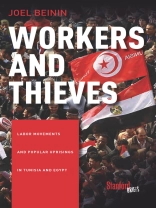Since the 1990s, the Middle East has experienced an upsurge of wildcat strikes, sit-ins, and workers’ demonstrations. Well before people gathered in Tahrir Square to demand the ouster of Hosni Mubarak, workers had formed one of the largest oppositional movements to authoritarian rule in Egypt. In Tunisia, years prior to the 2011 Arab uprisings, the unemployed chanted in protest, ‘A job is a right, you pack of thieves!’
Despite this history, most observers have failed to acknowledge the importance of workers in the social ferment preceding the removal of Egyptian and Tunisian autocrats and in the political realignments after their demise. In Workers and Thieves, Joel Beinin corrects this by surveying the efforts and impacts of the workers’ movements in Egypt and Tunisia since the 1970s. He argues that the 2011 uprisings in these countries—and, importantly, their vastly different outcomes—are best understood within the context of these repeated mobilizations of workers and the unemployed over recent decades.
Tabela de Conteúdo
Introduction: Workers, Collective Action, and Politics
1. Colonial Capitalism to Developmentalism
2. The Washington Consensus
3. Insurgent Workers in the Autumn of Autocracy
4. Popular Uprisings in 2011 and Beyond
Conclusion: Workers, Social Struggles, and Democracy
Sobre o autor
Joel Beinin is the Donald J. Mc Lachlan Professor of History at Stanford University. He has written or edited ten books, most recently
Social Movements, Mobilization, and Contestation in the Middle East and North Africa, co-edited with Frédéric Vairel (Stanford, 2013) and
The Struggle for Worker Rights in Egypt (2010). His articles have been published in leading scholarly journals, as well as
The Nation,
Middle East Report,
The Los Angeles Review of Books,
South Atlantic Quarterly,
Le Monde Diplomatique, and others.












